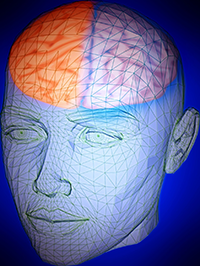- Have any questions? Contact us!
- info@dr-rath-foundation.org

Vitamins: Harm or Benefit?
October 12, 2017
New study shows air pollution may be causing kidney disease
October 13, 2017Clinical trial shows magnesium supplements may be an alternative to antidepressant drugs

A recent clinical trial conducted in the United States has found that magnesium supplements are effective in the treatment of mild-to-moderate depression. Published in the PLoS One journal, the researchers showed that daily supplementation with magnesium leads to a significant decrease in depression and anxiety symptoms regardless of a patient’s age, gender, baseline severity of depression, or use of antidepressant drugs. Noting that magnesium works quickly and is well tolerated, the study concluded that it may be a safe over-the-counter alternative to pharmaceutical medication.
 Conducted over a period of 12 weeks, the study involved a total of 126 patients with an average age of 52. Each patient was randomly assigned to one of two groups. The first group received the magnesium supplements for a period of 6 weeks, while the second group received no treatment during this time. For the following 6 weeks the roles of the two groups were reversed, with the second group then being given the supplementation.
Conducted over a period of 12 weeks, the study involved a total of 126 patients with an average age of 52. Each patient was randomly assigned to one of two groups. The first group received the magnesium supplements for a period of 6 weeks, while the second group received no treatment during this time. For the following 6 weeks the roles of the two groups were reversed, with the second group then being given the supplementation.
During each 6-week treatment portion of the trial, the magnesium was given to the patients at a dose of 248 mg per day. Impressively, the researchers found an improvement in symptoms was evident within two weeks and that it was maintained during treatment. Notably, therefore, based on their experiences during the trial, a majority of the patients reported they would use magnesium supplements in the future.
Growing evidence that nutritional approaches are effective against depression
 The publication of this study adds to the growing evidence that nutritional approaches are effective in controlling depression. Recently, for example, in a finding consistent with the key principle of Cellular Medicine that long-term micronutrient deficiency is the primary cause of chronic diseases, a scientific review noted that low levels of B vitamins are common in patients with depression and that supplementation with these nutrients has been shown to improve depression outcomes.
The publication of this study adds to the growing evidence that nutritional approaches are effective in controlling depression. Recently, for example, in a finding consistent with the key principle of Cellular Medicine that long-term micronutrient deficiency is the primary cause of chronic diseases, a scientific review noted that low levels of B vitamins are common in patients with depression and that supplementation with these nutrients has been shown to improve depression outcomes.
Similarly, a meta-analysis published in 2016 found that omega-3 fatty acids can reduce symptoms of even major depressive disorder. Examining 13 randomized placebo-controlled trials involving 1,233 participants suffering from the condition, the researchers stated that higher doses of eicosapentaenoic acid (EPA) were especially beneficial.
We are what we eat
As the researchers in the magnesium study point out, depression now affects a staggering 350 million people worldwide. With this mental health condition predicted to become the leading cause of disease burden by 2030, not only are drugs of varying and unpredictable effectiveness in controlling it, they also carry a risk of side effects and are associated with long-term problems such as diabetes. Of particular concern is the finding that the most commonly used class of antidepressants, known as selective serotonin reuptake inhibitors (SSRIs), are linked with homicide and other violent crimes.
 While the trillion dollar a year pharma industry would undoubtedly prefer patients to believe nutrition is not effective against mental health disorders, studies clearly show that our psychological wellbeing is closely linked to the food we consume in our daily diets. Dietary improvement has been demonstrated in randomized controlled trials to be effective in the management of major depression, for example, while consumption of fast food and commercial baked goods is known to be linked to an increased risk of depression.
While the trillion dollar a year pharma industry would undoubtedly prefer patients to believe nutrition is not effective against mental health disorders, studies clearly show that our psychological wellbeing is closely linked to the food we consume in our daily diets. Dietary improvement has been demonstrated in randomized controlled trials to be effective in the management of major depression, for example, while consumption of fast food and commercial baked goods is known to be linked to an increased risk of depression.
Rather than the route to happiness being supplied in toxic chemical form by the drug industry, scientific evidence increasingly suggests that the old adage ‘we are what we eat’ applies just as much to our mental health as it does to our physical wellbeing. As such, one could argue that the pharmaceutical ‘business with disease’ isn’t merely the biggest barrier to health; in tandem with the multinational food industry, it’s also one of the biggest obstacles to a happier world.



